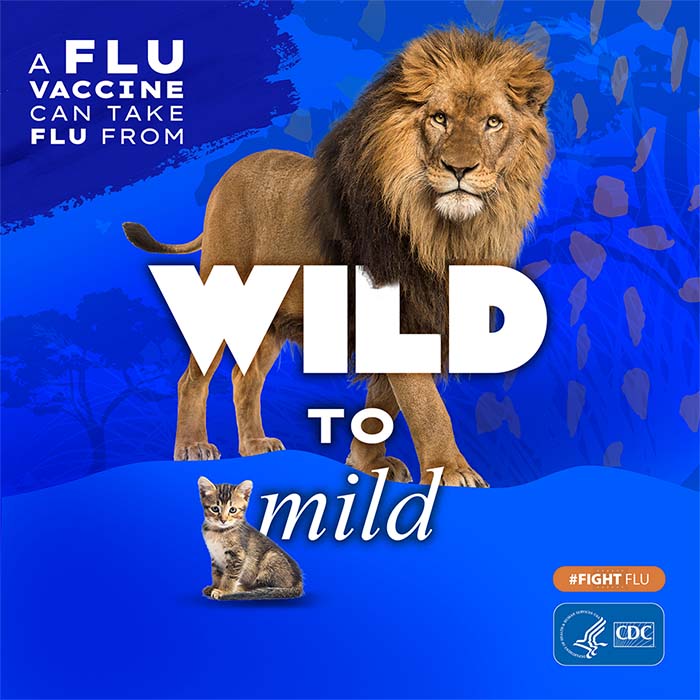CDC Research Confirms Benefits of Flu Antiviral Drugs, Even Beyond 2 Days After Symptoms Start
New research confirms benefits of the influenza antiviral medication oseltamivir in treating children with uncomplicated flu illness and shows that treatment can be beneficial even beyond the two-day window recommended as a cut-off for treatment in the drug’s package insert.
A new study on influenza (flu) antiviral drugs by CDC authors was released today in The Lancet Infectious Diseases. This study is the first clinical trial to note a significant reduction in the duration of illness and virus shedding in children when influenza antiviral treatment was initiated more than 2 days after the onset of influenza (flu) symptoms. These findings confirm the benefits of using the antiviral drug oseltamivir to treat flu illness and suggest that some children will benefit when treatment is initiated beyond 2 days, which is the recommended cut-off for treatment in the current package insert.
The patients in this double-blind, randomized, placebo-controlled study were mostly children (average age: 5 years) in an urban setting in Bangladesh with laboratory-confirmed influenza infection and no additional flu-related complications. Patients were treated with either oseltamivir (a type of flu antiviral drug known as a “neuraminidase inhibitor”) or a placebo (e.g., a shot of saline). Researchers observed when patients began oseltamivir treatment — either less than 48 hours or 48 hours or more after illness onset — and collected information about the duration of flu symptoms using standardized forms collected from daily household visits. In addition to documenting the duration of flu symptoms, researchers also measured viral shedding, which is virus detection at various times after the patients were enrolled. The detection of live virus in respiratory secretions is thought to be associated with how contagious a person is to others.
Among all children receiving oseltamivir within 5 days of illness onset, researchers found that overall flu symptoms were reduced by one day compared with those treated with placebo (3 days versus 4 days). This finding is consistent with results from other flu antiviral studies that started treatment within 2 days of illness onset. The results also show that oseltamivir treatment reduced the amount of live virus that was isolated from respiratory specimens by 12% to 50% compared with placebo regardless of whether treatment was started before or after 2 days since illness onset. This finding is especially important because no other study has shown reduced viral shedding in similar proportions regardless of whether treatment is started less than or more than 48 hours after flu symptoms begin.
Influenza viruses spread and cause illness and deaths every flu season. While CDC recommends flu vaccine as the first step to fight flu, antiviral drugs are a second line of defense that can be used to treat flu illness. Antiviral drugs are NOT a substitute for getting a flu vaccine. However, as noted in The Lancet Infectious Diseases study and other published studies, antiviral drugs can shorten the length of flu illness and virus shedding. Observational studies suggest that antiviral drugs also can prevent serious flu complications, like pneumonia. CDC recommends that antiviral drugs be used as early as possible in people who are very sick with the flu (for example, hospitalized patients) and people who are sick with the flu and have a greater chance of getting serious flu complications, either because of their age or because they have a medical condition that places them at high risk from influenza complications.
While this study showed some benefit in reducing symptoms among children with uncomplicated influenza when treatment was started 2 days or more after symptom onset, the majority of evidence shows that the greatest clinical benefit occurs when treatment is initiated within 48 hours of flu illness onset. Though few adverse reactions were noted in the present study, some side effects have been associated with the use of flu antiviral drugs, including nausea, vomiting, dizziness, runny or stuffy nose, cough, headache and some behavioral side effects.
There are two antiviral drugs recommended by the CDC and approved by the FDA for flu treatment. These are oseltamivir (brand name Tamiflu®), which was used in this study, and zanamivir (Relenza®). There are no generic flu antiviral drugs. Tamiflu® comes as a pill or liquid, and Relenza® is an inhaled powder. (Relenza® should NOT be used in anyone with breathing problems, like asthma or COPD, for example.) These drugs have been in use since 1999.
To learn more about influenza antiviral drugs, visit the CDC website, Treatment – Antiviral Drugs.
The article is available in The Lancet Infectious Diseases: “Efficacy of oseltamivir treatment started within 5 days of symptom onset to reduce influenza illness duration and virus shedding in an urban setting in Bangladesh: a randomised placebo-controlled trial.”
